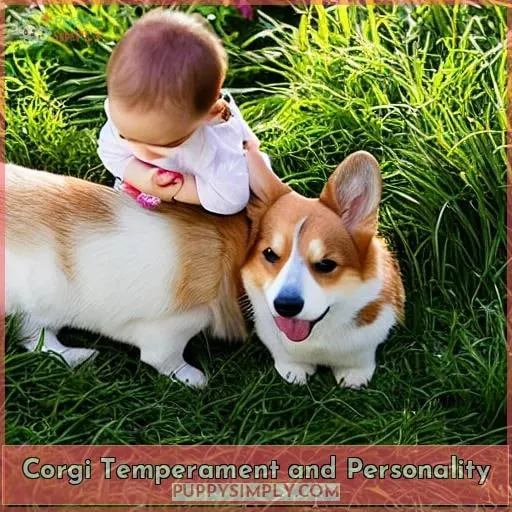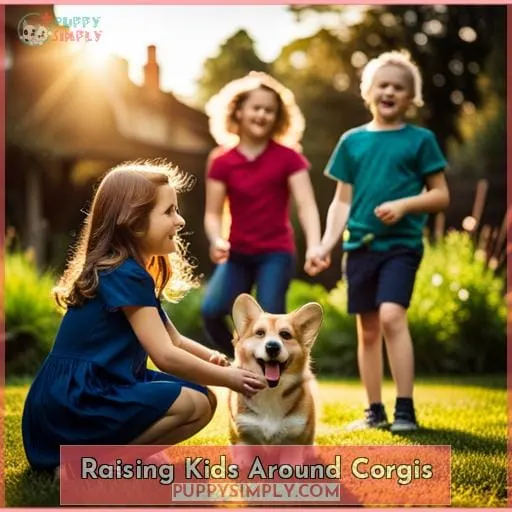This site is supported by our readers. We may earn a commission, at no cost to you, if you purchase through links.

Their playful nature and loving disposition may have you smitten, but let’s delve deeper into the compatibility of corgis and kids.
Exploring their temperament, training needs, and overall suitability as family companions.
Table Of Contents
- Key Takeaways
- Corgis and Kids: Positives and Negatives
- Corgi Temperament and Personality
- Corgis and Children: a Good Match?
- Training and Socializing Corgis
- Corgi Health Concerns
- Corgis for First-Time Owners
- Exercising Your Corgi
- Corgis and Babies
- Raising Kids Around Corgis
- Other Breeds for Families With Children
- Frequently Asked Questions (FAQs)
- How does a corgi’s herding instinct impact its behavior around children?
- What are the key differences between a corgi’s temperament and personality as a puppy compared to adulthood?
- Are corgis prone to separation anxiety, and if so, how can it be managed?
- Can corgis be trained to be therapy dogs, and what specific traits make them suitable for this role?
- What are some creative ways to exercise a corgi indoors, especially during inclement weather?
- Conclusion
Key Takeaways
- Corgis can be great playmates for children due to their playful, energetic, and intelligent nature.
- Supervision is essential for safe interactions between corgis and kids, as corgis may exhibit herding instincts like nipping and chasing.
- Patience and positive reinforcement are key to training corgis to be obedient and well-behaved, as they have an independent streak.
- Early socialization is crucial for corgis to learn how to interact appropriately with others, including children.
Corgis and Kids: Positives and Negatives
Corgis, known for their playful and energetic nature, make great playmates for children.
They’re intelligent and eager to please, creating a strong bond with kids.
However, their herding instincts can lead to nipping and chasing, potentially frightening or harming young children.
Supervision is key to ensure safe and positive interactions.
Early socialization with other animals and people helps corgis adapt to different situations and behave appropriately.
Consider your child’s age and the corgi’s temperament before introducing them.
Choose appropriate activities that suit both the corgi’s energy level and the child’s abilities.
With proper supervision, training, and socialization, corgis can bring joy and companionship to families with children.
Corgi Temperament and Personality
So, you’ve weighed the pros and cons of bringing a corgi into your family.
Now, let’s delve into the temperament and personality of these active and affectionate dogs.
Corgis are known for their playful and energetic nature, making them excellent playmates for children.
They’re intelligent and eager to please, but their independent streak can sometimes pose training challenges.
However, with patience and positive reinforcement, corgis can learn to be obedient and well-behaved family members.
While corgis are fiercely loyal and affectionate, they can also be quite independent.
This means they may not always be as cuddly or eager to please as other breeds.
However, their independence also makes them less prone to separation anxiety, a common problem in dogs who are overly attached to their owners.
Socialization is crucial for corgis, as it helps them learn how to interact appropriately with other people and animals.
Early socialization can help prevent problems such as aggression or fearfulness.
If you’re considering bringing a corgi into your family, be prepared to invest time and effort into training and socialization.
With the right care and attention, corgis can make wonderful companions for families with children.
Corgis and Children: a Good Match?
When considering whether corgis are a good match for your family, you should carefully:
- Evaluate your children’s ages, temperaments, and experiences with dogs.
- Ensure a harmonious relationship between your corgi and your children.
Start by:
- Introducing your corgi to your child gradualmente, allowing them to become familiar with each other in a controlled environment.
- Set clear and teach your child how to intereact with the corgi respectfully.
- Supervise playtime to prevent any roughhousing or nipping.
Corgis are herding dogs, so they may try to chase or nip at your child’s heels.
To curb this behavior:
- Provide consistent training and socialization.
- Enroll your corgi in obedience classes and emphasize the command leave it and come.
If you have a baby or toddler, it’s best to wait until they’re older before introducing a corgi into your home.
Corgis can be rambunctious and may accidentally:
- Knock over or injure a young child.
Training and Socializing Corgis
Now that you’ve weighed the pros and cons of bringing a corgi into your family, let’s delve into the crucial aspect of training and socializing your furry friend.
With their intelligence and eagerness to please, corgis respond exceptionally well to positive reinforcement techniques.
Engage your corgi in interactive play sessions, rewarding good behavior with treats, praise, and affection.
Redirect Nipping with Positive Reinforcement:
If your corgi exhibits nipping behavior, redirect their attention with a toy or treat. This positive reinforcement encourages them to associate good behavior with rewards, curbing the nipping habit.
Prioritize Socialization:
Introduce your corgi to various people, animals, and environments from an early age. This socialization helps them adapt to different situations, reducing the likelihood of fear or aggression.
Involve the Whole Family:
Encourage all family members to participate in training and socialization efforts. This way, your corgi learns to respect and obey everyone in the household, strengthening the bond between your family and your beloved pet.
Corgi Health Concerns
Watch out for common health concerns in corgis, including:
- Hip dysplasia
- Progressive retinal atrophy
- Degenerative myelopathy
- Skin allergies
These issues can affect their mobility, vision, nervous system, and skin, causing discomfort and potentially reducing their lifespan.
| Health Concern | Symptoms | Prevention and Care |
|---|---|---|
| Hip Dysplasia | Limping, difficulty rising, reluctance to exercise | Maintain a healthy weight, provide joint supplements, consider surgical repair |
| Progressive Retinal Atrophy | Night blindness, loss of peripheral vision, eventual blindness | Regular eye exams, genetic testing, no cure |
| Degenerative Myelopathy | Hind leg weakness, dragging feet, loss of coordination, paralysis | Physical therapy, assistive devices, no cure |
| Skin Allergies | Itching, redness, hot spots, excessive licking | Regular bathing, hypoallergenic diet, avoid allergens |
Early detection and treatment are crucial for managing these conditions. Regular vet checkups, a balanced diet, and an active lifestyle can help keep your corgi healthy and happy.
Corgis for First-Time Owners
As a first-time dog owner, consider the amount of effort needed to raise a corgi.
Corgis are highly intelligent and require ample exercise and training. Their independent nature may pose training challenges, so seek guidance from experienced trainers if needed.
Grooming is another aspect to consider. Corgis have a double coat that sheds frequently, making them unsuitable for those with allergies or those seeking low-maintenance pets.
Apartment living may not be ideal for corgis due to their energy levels and need for exercise. If you live in an apartment, ensure you can provide them with sufficient outdoor time and activities to prevent boredom and destructive behavior.
Socialization is crucial for corgis to prevent behavioral issues. Expose them to various people, animals, and environments from an early age. This will help them develop good manners and reduce the risk of anxiety or aggression.
Exercising Your Corgi
Don’t neglect your corgi’s exercise needs. They demand at least an hour of daily physical activity.
A lively and athletic breed, corgis thrive on a stimulating fitness routine.
Dedicate time each day to engage your corgi in outdoor activities, such as running, walking, or herding balls.
Embrace their playful spirit with games of fetch, swimming sessions, and hide-and-seek adventures.
Beyond these structured exercises, encourage playtime escapades in a safe, enclosed area.
Engage your corgi’s natural instincts with canine workouts that mimic their herding heritage, like chasing a lure or retrieving objects.
Prioritize their daily dose of exercise to ensure a harmonious and fulfilling life together.
Corgis and Babies
Introducing your baby to a Corgi requires careful planning and supervision.
Start by letting them sniff each other from a distance. Gradually decrease the distance as they grow comfortable.
Teach your baby to be gentle and respectful of the Corgi, and never leave them unsupervised together.
Bonding between baby and Corgi can be beautiful. Encourage them to play together under your watchful eye.
Establish clear boundaries and rules for both baby and Corgi.
Train your Corgi to behave appropriately around babies. Teach them basic commands like sit, stay, and come.
Integrating a Corgi into your family with a baby can be a rewarding experience. With patience, love, and proper training, your Corgi and baby can become the best of friends, creating cherished memories for years to come.
Raising Kids Around Corgis
To raise kids around corgis, train both the dog and the children to respect each other’s boundaries.
Teach your child to ask before petting the corgi and to avoid pulling its ears or tail.
Teach your corgi basic commands like sit, stay, and come, and ensure it understands that children are off-limits for nipping or chasing.
Establish supervised playtime to ensure both parties’ safety.
Make playtime fun by engaging in activities like fetch or hide-and-seek.
Involve your child in grooming the corgi.
This bonding experience teaches your child responsibility and reinforces the idea that the corgi is a family member.
Encourage your child to help train the corgi.
This not only strengthens the bond between them but also teaches your child valuable lessons in patience and consistency.
Other Breeds for Families With Children
If corgis aren’t the perfect fit, consider other breeds better suited for families with young children.
Golden Retrievers are renowned for their family-friendly nature, making them excellent companions for kids of all ages.
Beagles, with their kid-friendly traits, are gentle and playful.
Labradoodle mixes offer a loving and safe mix of Labrador and Poodle.
Bulldog buddies, known for their kid-focused nature, are patient and protective.
Poodle mixes make kid-approved companions with their intelligence and affectionate demeanor.
Research these breeds to find the perfect match for your family’s needs and lifestyle.
Frequently Asked Questions (FAQs)
How does a corgi’s herding instinct impact its behavior around children?
Their herding instinct might lead them to nip and chase children, potentially causing fear or harm.
Proper training and socialization are crucial to curb this behavior and ensure a harmonious relationship.
What are the key differences between a corgi’s temperament and personality as a puppy compared to adulthood?
As a corgi matures from puppyhood to adulthood, its boundless energy often mellows into a calmer, more dignified demeanor.
This transformation brings a shift in focus from playful antics to a deeper bond of companionship and loyalty.
Are corgis prone to separation anxiety, and if so, how can it be managed?
Separation anxiety can indeed trouble corgis.
To manage it:
- Create a routine.
- Provide plenty of exercise and mental stimulation.
- Gradually accustom your corgi to being alone.
Can corgis be trained to be therapy dogs, and what specific traits make them suitable for this role?
With their gentle nature and eagerness to please, corgis excel as therapy dogs, comforting over 1 million people annually.
Their empathy and loyalty make them natural healers.
What are some creative ways to exercise a corgi indoors, especially during inclement weather?
Rainy days got you and your corgi feeling blue?
Turn your home into an indoor playground!
Hide treats for a sniffing scavenger hunt.
Play fetch in the hallway.
Set up an obstacle course using chairs and blankets.
Your furry friend will love the mental and physical stimulation.
Conclusion
Picture this:
A joyous symphony of laughter and barks fills the air as your corgi and your child embark on a playful adventure in the park.
The corgi’s wagging tail paints a vibrant trail of happiness, mirroring the joy in your child’s eyes.
With careful training and unwavering love, corgis can indeed be the perfect family dog, weaving a tapestry of cherished memories that will last a lifetime.
















